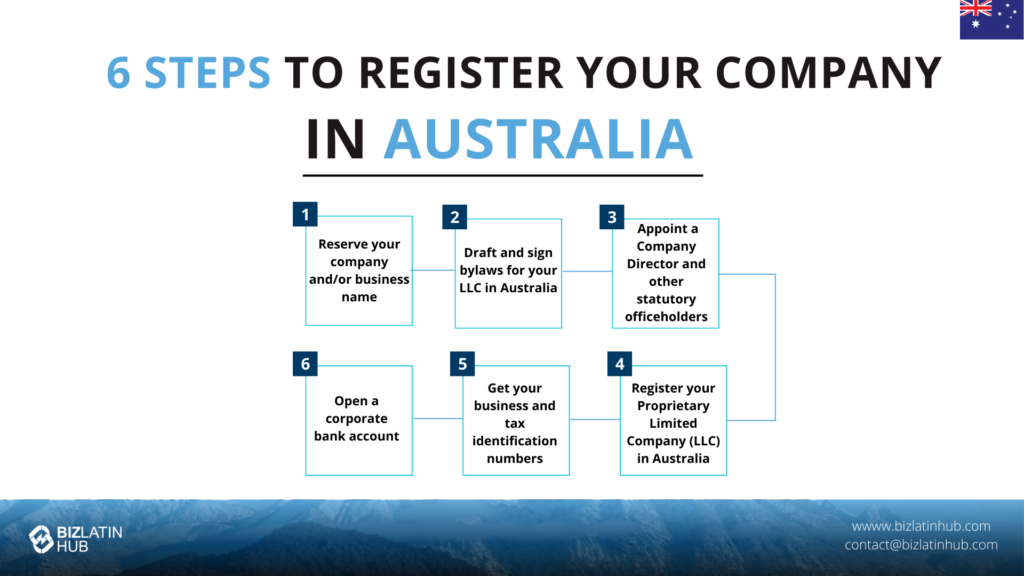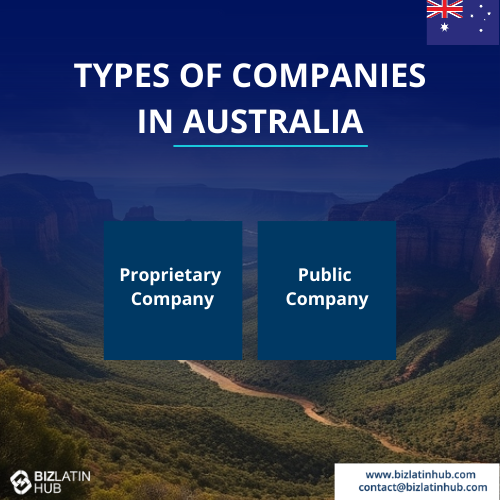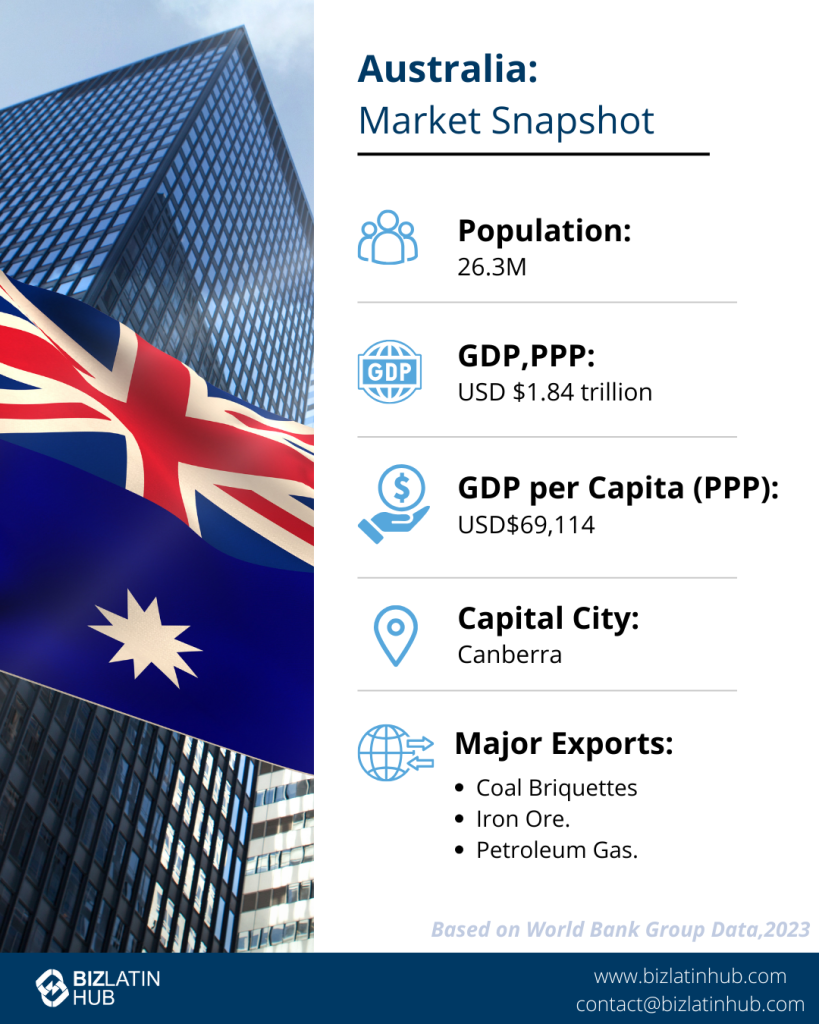Starting a business in Australia presents excellent opportunities for foreign investors, thanks to the country’s stable economy, transparent regulatory framework, and strategic location in the Asia-Pacific region. To ensure a seamless company incorporation in Australia, it is essential to follow the necessary steps and comply with local corporate laws as overseen by regulatory body ASIC. There are a number of different company types in Australia, with pros and cons to each.
Key Takeaways on Company Formation in Australia
| Is Foreign Ownership Permitted? | Yes, 100% foreign ownership by either legal persons (legal entities) or natural persons (individuals). |
| Steps for Company Formation in Australia | Step 1 – Reserve your company and/or business name. Step 2 – Draft and sign bylaws for your LLC in Australia. Step 3 – Appoint a Company Director and other statutory officeholders. Step 4 – Register your Proprietary Limited Company (LLC) in Australia. Step 5 – Get your business and tax identification numbers. Step 6 – Open a corporate bank account. |
| What Are The Common Entity Types In Australia? | Proprietary Limited Companies (PTY Ltd.) Public Companies (Ltd.) Partnership. Branch Office. |
| Why Incorporate a Company in Australia? | Investing in Australia offers consistent economic growth, a highly skilled workforce, strategic location, strong governance, and world-class infrastructure. |
Step-by-Step: How to Register a Company in Australia
In Australia, the government authorities that administer company formation processes are the Australian Securities and Investments Commission (ASIC) and the Department of Industry, Innovation, and Science.
Typically, the first step towards company formation in Australia is choosing your legal entity type. If you have chosen to start a Proprietary Limited Company (LLC), then you must follow these 6 steps to form an LLC in Australia:
- Step 1 – Reserve your company and/or business name.
- Step 2 – Draft and sign bylaws for your LLC in Australia.
- Step 3 – Appoint a Company Director and other statutory officeholders.
- Step 4 – Register your Proprietary Limited Company (LLC) in Australia.
- Step 5 – Get your business and tax identification numbers.
- Step 6 – Open a corporate bank account.

1. Reserve your company and/or business name
Each company in Australia needs its unique company name. It cannot be the same as that of another business. It is a good idea to check that your chosen name does not conflict with any registered or pending trademarks in Australia.
If you do not choose a company name during the company formation process, your Australian Company Number (ACN) will act as your company name.
The company name must display its legal status; as a Proprietary Limited Company, you must include ‘Proprietary’ or ‘Pty’.
A business name is slightly different from a company name. Business names do not create new, separate entities. Your business name is your trading name.
2. Draft and sign bylaws for your LLC in Australia
The next step when you form an LLC in Australia is to decide on the governance of the company. There are many ways to do this. Your options include:
- Operating your company under the replaceable rules listed under the Corporations Act,
- Creating a unique constitution,
- Incorporating elements of the replaceable rules, and including your own.
A Proprietary Limited Company with a sole director, who is also a single shareholder, does not need a formal internal governance system.
3. Appoint a Company Director and other statutory officeholders
To form your LLC in Australia, you will need to partner with a legal representative residing in Australia. This role is known as the Company Director. Each proprietary company must have at least one director.
The Company Director is responsible for overseeing the affairs of the company. Foreign companies can choose to appoint a Nominee Director, who is external to the company but is authorized to make legal decisions on its behalf. The individuals in these roles are responsible for ensuring the company is fully compliant with all obligations under the Corporations Act.
You will want to find a private services provider with experience in all commercial aspects of Australian law, including company incorporation, hiring staff, the signing of complex legal contracts, and company liquidation.
4. Register your Proprietary Limited Company (LLC) in Australia
You can register your company online or on paper. Australia’s Business Registration Services provides an online portal to complete your application.
There are certain cases where a company cannot register online. Therefore, it is helpful to engage an external service provider on the best steps for your company.
Once approved, your Proprietary Limited Company will receive its Australian Company Number, Australian Business Number, certificate of registration, and a corporate key to update your company information securely.
5. Get your business and tax identification numbers
Next, you must register for the appropriate taxes for your LLC in Australia. All businesses need a tax file number (TFN) to do this. This is automatically generated when you receive your Australian Business Number (ABN).
The ABN is a unique 11-digit number that identifies your business or organization to the government and community. This process can also be done online through the Business Registration Service website.
Before you can start doing business in Australia, you may need to register for goods and services (GST), income, withholding, and fringe benefits taxes, depending on your circumstances.
6. Open a corporate bank account
Once your company has been registered, you can set up a corporate bank account. There are several highly reputable banks in Australia offering several corporate banking options.
Generally, you can choose to create corporate checking, savings, and term deposits or fiduciary accounts. Each of these account types serves different purposes, and each can be valuable for companies.
The country’s Anti-Money Laundering and Counter-Terrorism Financing Act in 2006 set strict regulations for banks to undertake due diligence with new applicants. For this reason, you can expect to provide a wide range of documentation confirming your and your directors’ information, identification, and details of your newly registered company.
Requirements to Incorporate a Pty Ltd Company
You must have the necessary documents and information before starting the process of forming an LLC in Australia. At least one of your directors must be an Australian resident in order to comply with local laws. To proceed with incorporating your new LLC in Australia , you will need to provide the following:
- Confirm the name of the new legal entity to be incorporated
- Provide shareholder identification documents
- Confirm the business activities and corporate purpose of the company
- Share Entity Capital: Confirm the value and type of share structure

What are the Characteristics of an LLC in Australia?
In Australia, the equivalent to the LLC is called a Proprietary Limited Company (PTY) or Private Proprietary Company. To be in full corporate compliance when forming an LLC in Australia, you must have a good understanding of the characteristics of this entity type and what your legal obligations are. It is a company type that has few requirements to set up, which is why it is the most common type of legal entity in Australia. Like other LLC entity types, the owner is not personally liable for company debt.
The minimum requirements to form an LLC (Pty) in Australia include:
- 1 shareholder
- 1 company director
- 1 resident director
- Zero minimum share capital
For foreigners looking to conduct commercial activities in Australia, setting up a Proprietary Limited Company is one of the best available options.
LLCs in Australia need to produce annual financial statements. However, they do not need to register for GST if that year’s sales do not exceed AU$75,000.
Differences between a proprietary company and a public company in Australia
| Aspect | Proprietary Company | Public Company |
|---|---|---|
| Number of Partners | 1 to 50 shareholders | 1 or more shareholders (no maximum) |
| Administration | At least 1 director residing in Australia; non-resident directors allowed. All directors must apply for a director identification number. | At least 3 directors, 2 of whom must reside in Australia; non-resident directors allowed. All directors must apply for a director identification number. |
| Annual Meetings | Not required. | Annual general meeting is required. |
| Auditor | Generally not required for small proprietary companies; some large proprietary companies may not need an auditor. | Required to appoint an external auditor with increased financial and reporting requirements. Increased disclosure obligations. |
Tax and Legal Compliance in Australia
Once a Pty Ltd company is registered with the Australian Securities and Investments Commission (ASIC), it must complete several key registrations with the Australian Taxation Office (ATO) to operate legally:
- Australian Business Number (ABN):
The ABN is a unique 11-digit number that identifies your business for tax and invoicing purposes. It is mandatory for issuing tax invoices, registering for GST, and dealing with government agencies. Businesses must include their ABN on invoices and other official documents. - Tax File Number (TFN):
A TFN is required to lodge corporate income tax returns and ensure the business is properly tracked within the ATO system. The TFN is used for income reporting, tax assessment, and communication with the tax authority. - Goods and Services Tax (GST):
GST is a 10% value-added tax levied on most goods and services sold in Australia. Companies must register for GST if their annual turnover exceeds AUD $75,000. Once registered, businesses must include GST in their pricing and submit Business Activity Statements (BAS) either monthly or quarterly.
Failure to register for these obligations may result in tax penalties, denial of GST credits, and non-compliance warnings. Biz Latin Hub assists clients in completing all ATO registrations and maintaining ongoing tax compliance.
FAQs About Company Formation in Australia
Answers to some of the most common questions we get asked by our clients.
1: What’s the process to register a company in Australia?
To form a proprietary limited company (Pty Ltd), you must select a name, appoint directors (at least one must be a resident of Australia), register with ASIC, apply for an ABN and TFN, and register for GST if annual turnover exceeds AUD 75,000. You must also nominate a registered office in Australia.
2: Can a foreigner own a business in Australia?
Yes, a business can be 100% foreign-owned by either legal persons (legal entities) or natural persons (individuals).
3: What is the Australia Company Tax ID?
The Australia Company Tax ID is the Australian Business Number (ABN), a unique 11-digit identifier that makes it easier for businesses and all levels of government to interact.
4: What are the requirements for foreign investors?
Foreign investors must appoint an Australian-resident director, obtain an ABN and TFN, and provide a local registered address. All filings must comply with ASIC and ATO rules.
5: How long does it take to register a company in Australia?
Registering a company in Australia typically takes 2 to 5 business days, assuming all documentation is ready and submitted online.
6: What are the tax responsibilities?
Corporate tax is 30%, or 25% for small businesses. The GST is 10%, and registration is mandatory above a certain revenue threshold.
7. What does a proprietary company name mean in Australia?
A proprietary company in Australia, denoted by ‘Pty Ltd’ in its name, is a common business structure for small to medium-sized enterprises. It offers limited liability to shareholders (1-50), restrictions on share transfers, and compliance with ASIC regulations. While it has reporting requirements, it enjoys greater privacy than public companies.
8. What does a public company name mean in Australia?
In Australia, a public company is a business entity that can raise capital from the general public through the issuance of shares and can be listed on the Australian Securities Exchange (ASX). It has no limits on the number of shareholders and is subject to more extensive regulatory and reporting requirements compared to proprietary companies.
9. What entity types offer Limited Liability in Australia?
In Australia, both proprietary companies and public companies offer limited liability.
Benefits of Doing Business in Australia

Over the past 26 years, Australia has had consistent positive economic growth. Its economy is strong in mining, agriculture, and services, and the people are highly innovative. The country’s proximity to wealthy Asian markets makes it a powerful regional hub. The country’s favorable tax policies and robust infrastructure further enhance its appeal, making it an ideal location for businesses looking to expand into the Asia-Pacific region.
Australia is a highly attractive destination for business incorporation due to its stable economy, transparent regulatory framework, and strong trade relationships with major global markets. Incorporating a Limited Liability Company (LLC) in Australia offers significant benefits, including limited personal liability for business debts, straightforward compliance requirements, and access to a skilled and diverse workforce.
Setting up an LLC in Australia also provides flexibility in terms of ownership structure, allowing for both domestic and foreign investors to participate. The process of incorporation is efficient, supported by the Australian government’s proactive approach to simplifying business registration and compliance. Moreover, Australia’s reputation for innovation and its supportive business environment foster growth opportunities across various industries. By choosing to incorporate an LLC in Australia, businesses can tap into a dynamic market and establish a strong foothold in one of the world’s most economically competitive countries.
Biz Latin Hub can help you form your LLC in Australia
As a foreign company expanding to Australia, it’s beneficial to seek out an external provider who can act as your Nominee Director in the country. That way, you can get specialist support to form your LLC in Australia in full compliance with corporate regulations.
Get started in a strong, stable economy with minimum liability by forming a Proprietary Limited Company in Australia through Biz Latin Hub. Our team of local and expatriate professionals has the depth of knowledge and experience to enable foreign companies in Australia through providing a full range of market entry and back-office services. This includes market entry strategy, company formation, ongoing commercial representation, hiring, visa processing, and due diligence activities.
Get in touch with us here at Biz Latin Hub for personalized advice on how you can get started.
Learn more about our team and expert authors.





